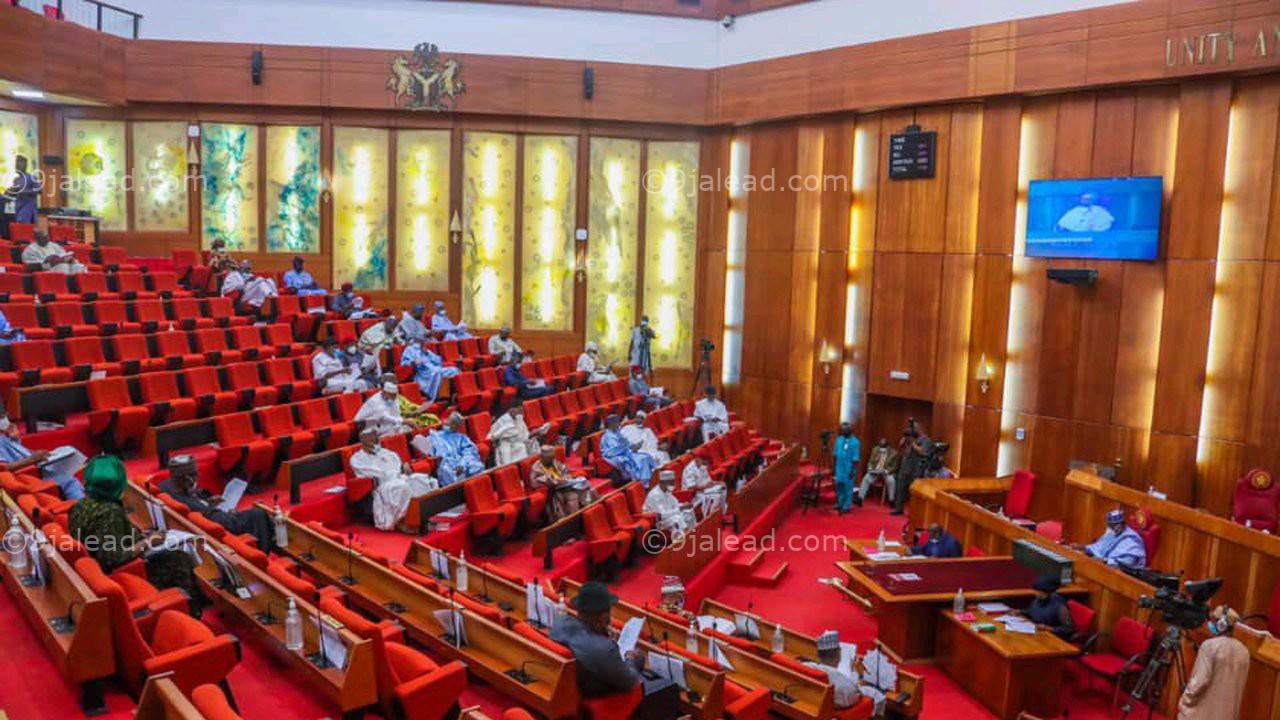The Senate will meet with a delegation of the Federal Government today to resolve the criticisms on the proposed tax reform bills currently before the two chambers of the National Assembly....CLICK HERE TO CONTINUE READING.>>
The Deputy President of the Senate, Jibrin Barau, disclosed this when he presided over Wednesday’s plenary.
Thank you for reading this post, don't forget to subscribe!Barau said the meeting will be held at the National Assembly Complex, Abuja, adding that it was necessary for the lawmakers to have extensive interaction with the government officials before passing the tax reform bills.
He said the Senate Minority Leader, Abba Moro, will lead the senators to the meeting.
Other senators, who will attend the meeting according to the Deputy Senate President, are the Senate Chief Whip, Tahir Monguno; Adamu Aliero, (PDP, Kebbi Central), and Seriake Dickson (PDP, Bayelsa West).
Others are Titus Zam (Benue South), Abdullahi Yahaya (Kebbi), Adeola Olamilekan (APC, Ogun West), Sani Musa (APC, Niger East) and Adetokunbo Abiru (APC, Lagos East).
President Bola Tinubu had on Tuesday directed the Ministry of Justice to work with the National Assembly to address some of the concerns generated by the Tax Reform Bill currently before the legislature.
The Minister of Information and National Orientation, Mohammed Idris, who disclosed this in a statement he issued in Abuja, said the nationwide debate on the new tax reform bills was commendable.
He however pointed out that there was a lot of misinformation and fake news circulating around the tax bills and the overall reform agenda of the Tinubu administration.
Tax reforms urgent to address struggles of Nigerians — Oyedele
In the same vein, the Chairman of the Presidential Committee on Fiscal Policy and Tax Reforms, Taiwo Oyedele, has stated that the need to pass the Tax Reforms Bills is “urgent” because most Nigerians are struggling.
Oyedele made this statement during a live television programme on Wednesday, in response to comments made by Borno State Governor, Professor Babagana Zulum, regarding the proposed bills currently before the National Assembly.
He also stated that the proposed 60 per cent derivation is the only way to promote more equity in the sharing of VAT while encouraging economic activities across Nigeria.
Zulum had recently accused Oyedele’s team of rushing the enactment of the tax reforms, claiming that the bills are accompanied by misconceptions that require further consultation.
“On this tax issue, there are a lot of misconceptions. We felt that the VAT provision in the tax law, based on the calculations we did, would only benefit Lagos and Rivers States. We did our research and concluded that we would lose.
“Why are we in a rush? We advised the Federal Government to take a pause and remove some of the clauses that are detrimental to Northern Nigeria. What we are saying is, give us more time, let us do deeper consultations to understand the details of this tax regime before passing it into law,” Zulum added during a live television interview.
In response, Oyedele denied rushing the bills, adding that everyone, including the governor, “needs to acknowledge that we are at a stage where the majority of our people are struggling and living in multi-dimensional poverty.”
He pointed out that small businesses are dealing with over 60 official levies and taxes, as well as more than 200 unofficial ones, while many people are struggling to feed themselves due to escalating food inflation.
“Our small businesses are burdened with over 60 official levies, taxes, and more than 200 unofficial ones. We are struggling just to help people feed themselves because inflation is escalating.
“We have people who don’t have decent jobs. That’s why the poverty rate is high, even though the unemployment rate is officially low. We are dealing with all these issues.
“If you want to provide relief for your people, you should do it quickly because it’s urgent. It’s an emergency. The way we should respond to these issues should be similar to how the world responded to COVID-19.
“There were countries where laws were passed within two days because it was an emergency. We are not even doing it in two days. We have been working on this for over a year,” he said.
Oyedele explained that his team had met with the governors in May, sharing drafts with them.
“We engaged with the governors, but you can imagine that if you manage to get airtime with them, they are unlikely to give you one or two hours. There was a particular meeting where we had only 15 minutes.
“And I said jokingly to the governors that I don’t expect your excellences to read all these details because we have also shared them with your technical staff.
“But we have done all of that. The bills are now in the National Assembly. As we speak, the bills have been there for over a month. So, I don’t think that’s rushing it,” he said.
He added that there is no rush, as the bills are currently under scrutiny in the National Assembly, but emphasized that stakeholders should work to finalise the bills quickly so that relief can be provided to the Nigerian people.
“We are always happy to engage more, but we believe that what is happening now is healthy and good for our development because there is more attention on this issue, which provides an opportunity for further engagement.
“Because of the inequity we aim to correct, we hadn’t anticipated this pushback from other states. We thought the opposition would come from Lagos State and Rivers State, based on the data we had. It’s almost as though the people we are fighting for are now fighting us. If we had known where the pushback would come from, we would have engaged more,” he added.
Engage stakeholders in tax reform debate, group urges NASS
Meanwhile, a civil society organisation, Christian Conscience, has called on the National Assembly to ensure broad-based engagement with critical stakeholders before passing the proposed tax reform bills submitted by the Federal Government.
In a statement released in Lagos on Wednesday and jointly signed by its National President, Yetunde Akinluyi, and National Secretary, Kolawole Verrals, the group commended lawmakers for providing a platform for discussions but emphasised the importance of inclusive public hearings.
“The proposed tax reform is a positive step that could streamline Nigeria’s tax regime. However, to build public trust and inclusivity, it is essential that this reform undergoes robust and informed public debate.
“Public hearings will allow Nigerians from all walks of life to contribute meaningfully to the process, ensuring the reform addresses the concerns of all stakeholders,” the communiqué stated.
The group said that tax reforms, when inclusive, are crucial for nation-building.
“Globally, tax reforms are instrumental to economic transformation and empowerment. From our findings, the bills before the National Assembly are geared toward inclusive economic growth, but they must be approached with transparency and openness,” the statement added.
Christian Conscience also urged political leaders to avoid divisive politics and focus on uniting the country.
“Our leaders should criticize constructively when necessary, using facts and figures, rather than politicising federal initiatives. Nigeria belongs to all of us,” the group said.
The group expressed optimism about the tax reform’s potential to empower citizens and drive economic growth, provided it is enacted through an inclusive and transparent process.
As the year drew to a close, the organisation encouraged Nigerians, especially Christians, to celebrate the festive season with moderation and prayed for divine intervention in the nation’s affairs.
The new tax bills under consideration in the National Assembly propose adopting a derivation principle in the allocation of VAT revenues between the federal government and sub-national entities.
These proposals have sparked controversy, with northern elites openly rejecting them, arguing that the changes may not favour their region.
Under the current Section 40 of the VAT Act, VAT revenue is allocated as follows: 15 per cent to the Federal Government, 50 per cent to the States and Federal Capital Territory, and 35 per cent to Local Governments.
The allocation to states and local governments incorporates a derivation principle of at least 20 per cent.
Although not explicitly detailed in the VAT Act, other factors influencing the distribution include 50 per cent based on equality and 30 per cent based on population.
Additionally, 4 percent of collections are allocated to the Federal Inland Revenue Service as a collection fee, while 2 per cent goes to the Nigeria Customs Service for import VAT.…..For More READ THE FULL ARTICLE HERE ▶▶











